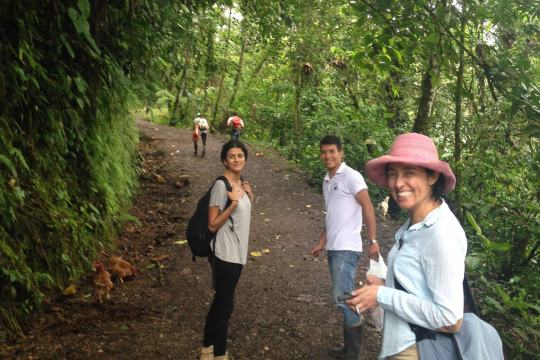“I believe that the most valuable asset of women is solidarity”
Meet Ximena Rueda, EfD Colombia researcher and WinEED member! We talked about her experiences as a researcher and the importance of solidarity among younger as well as senior women researchers.
Ximena Rueda’s interests in nature and society began when she was a child and traveled with her family along the landscapes of Colombia. Her father was a sociologist. He liked taking the family on trips to the remote regions of Colombia, which made Ximena Rueda curious about geography, climate, vegetation, and the life and economic realities of people who lived in rural areas. She became interested in development issues and started studying economics at the School of Economics at Universidad de los Andes.
To her dismay, economics turned out to be a very abstract discipline, which (apparently) could not give her the tools to understand the contextual differences in the realities of the people who live in the Colombian mountains. At that time, economics was taught to train future officials at the Ministry of Finance or the National Planning Department, in which economists worked with macroeconomic models and were concerned mainly with monetary and fiscal policies. However, in the last semester of her undergraduate studies, Ximena Rueda was lucky to take a course in agricultural economics and natural resources with professors Carlos Felipe Jaramillo and Jorge Ramírez, today at the World Bank and Harvard University. This changed her view of the discipline because she found that applied economics gave her better tools to understand the realities that she saw in the rural landscapes of Colombia.
Combining the academic and development sectors
After graduating from the School of Economics, Ximena Rueda started working at institutions such as the Ministry of Agriculture, and the Colombian Coffee Growers Federation where she could deepen her knowledge of the role of agriculture in development. This allowed her to better define her research interests on the connections between people and the environment. She received her Ph.D. in geography from Clark University in 2007. She wrote her dissertation evaluating the environmental and economic impacts of conservation programs on the communal lands surrounding the Calakmul Reserve in Southern Mexico. Upon her return to Colombia, she found attractive opportunities in the development sector, where she could put to practice the applied side of her studies and her managerial skills. She worked in a US-funded crop substitution program for coca-growing families and went back to the Coffee Growers Federation as part of their commercial division. She returned to academia to take a postdoctoral research position at Stanford University, where she specialized in the connection between globalization and land system sciences. During her studies, she took advantage of her experience working in the coffee sector to refine her questions on corporate investments in sustainability in commodities supply chains.
Mentors showed great support
Ximena Rueda’s mentors have been mostly men. Her first mentors were the two professors on agricultural and natural resource economics who later became her bosses and encouraged her to pursue graduate studies in the US. Her Ph.D. thesis advisor, Professor Billie Turner, at Clark University encouraged her to advance her research interests, supported her fieldwork in Mexico, and opened doors for her in the fields of geography and land system science. During her postdoctoral studies at Stanford University Professor Eric Lambin showed a lot of respect for what she wanted to do, and supported her to take the initiative to define the direction of her studies. He gave her the freedom to advance her interests and helped fund her initiatives.
“The most important legacy from my mentors is that I learned to believe in myself, to have confidence in the quality of my research, and to trust my instincts about the relevance of what I wanted to pursue. Such support is very important for a mentee,” says Ximena Rueda.
She also adds: “I don’t know if it is a coincidence that all my mentors are men. I don’t think it is because land change science is a very masculine world, because there are so many wonderful women researchers with whom I work and whom I cite in my research; perhaps it had been a very masculine field and only recently has become more open to women”.
Women’s solidarity is key to developing a career
Ximena Rueda thinks that due to women’s lives and the many tasks that demand women’s time and attention, women create a supportive network with other women, which is very valuable for moving forward in their careers. Men can, of course, express tremendous solidarity, but because of lower expectations with regards to non-work responsibilities, they do not need to build such a close network of support and they do not always find the opportunity to be part of one.
The good thing, according to her, about solidarity is that it is reciprocal and generous.
Ximena Rueda considers that: “Feminism is interesting because it is, among many other things, a response to the hyper-competitive expectation of individuals rising to the top, in which the individual alone succeeds by being better than others. The idea behind the social fight for equality is that we move together. But this doesn’t mean that men cannot be supportive; that there are intrinsic characteristics that make men different from women; it is just that the historical processes of discrimination and patriarchy have forced women to find new ways to fight for their rights.”
Ximena Rueda also thinks that solidarity among women colleagues is crucial in the academic world. She concludes that: “It is a horizontal relationship in which women researchers can find support for publishing together, doing administrative tasks and achieving institutional goals, get recommendation letters, provide career advice, and simply foster long-lasting friendships. The support I have received from my female colleagues, older or younger, is as nurturing and inspiring as the one that my mentors have provided; it just works in different ways”.
By: Manuela Fonseca (comm officer for EfD Colombia and WinEED)
